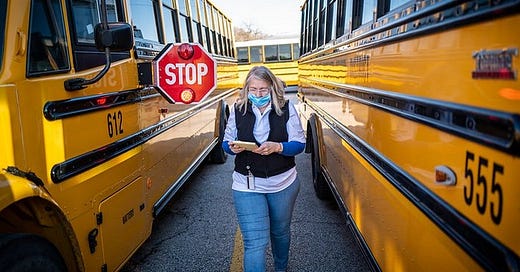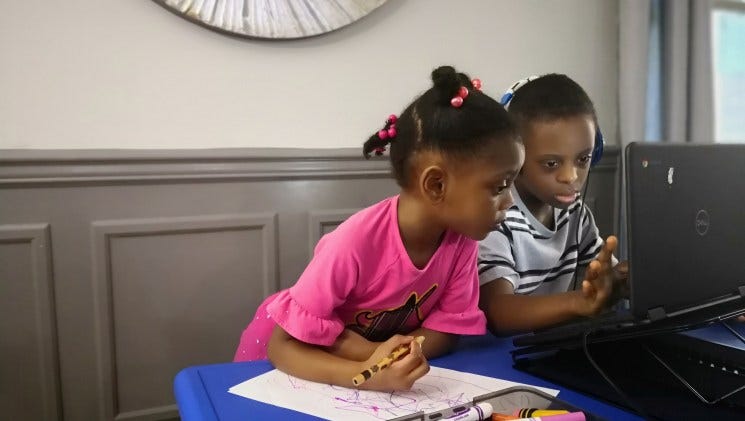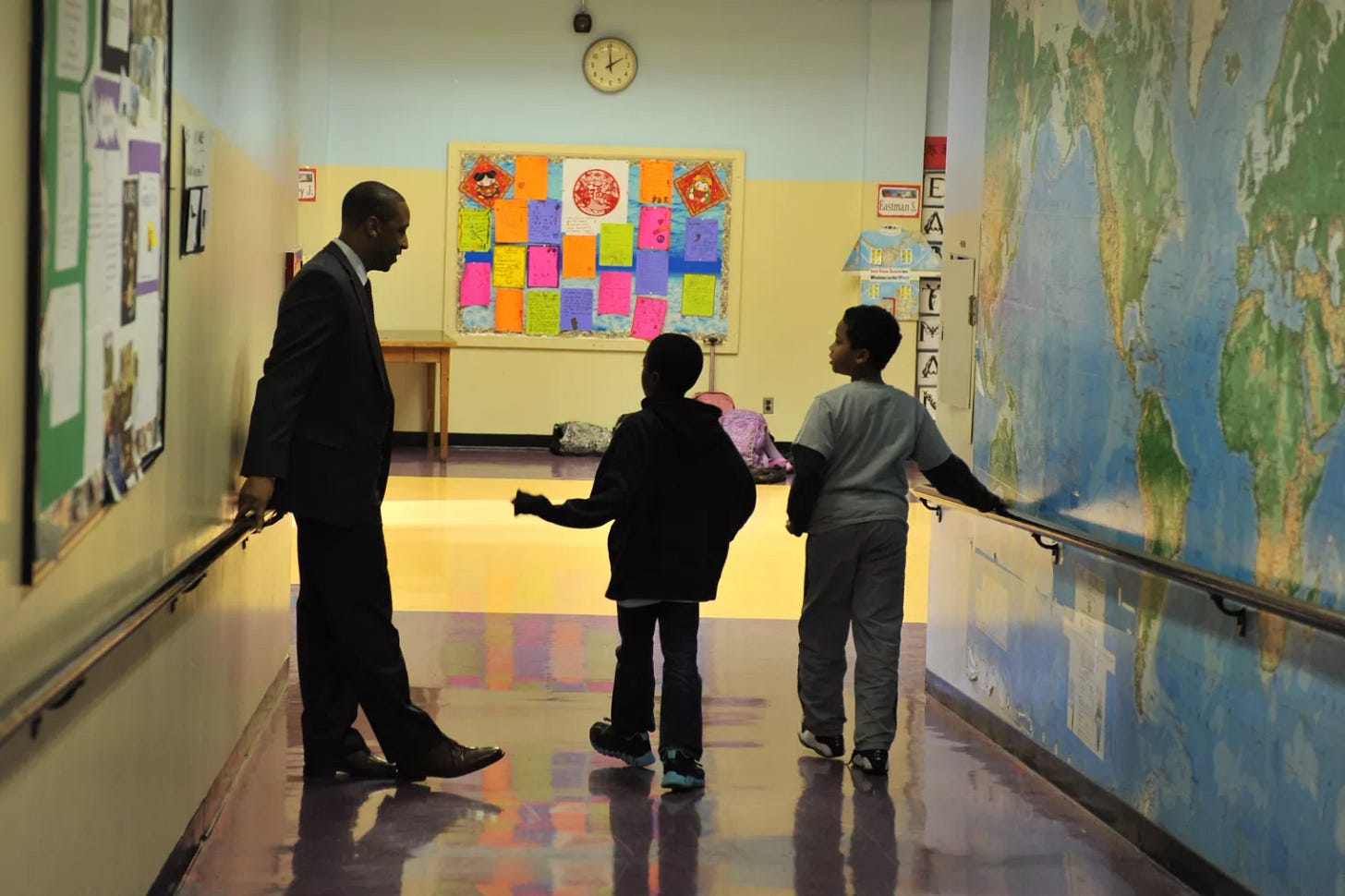I vividly remember the parent-teacher conference that changed the way I think about data. I was a beginning, second grade teacher and my principal decided to join us because he knew the family may be emotional about the difficult decisions we’d discuss. I knew I needed to illustrate the students’ academic achievement and path towards growth to get back on track. At the time, we tested our struggling readers with a progress monitoring tool every two to four weeks, so I was well equipped with data about this students’ academic progress. I had learned already that the reports available didn’t provide detailed trends and overall growth goals. So, I spent hours at the beginning of the year creating my own report for each student so they could chart their progress towards proficiency.
With this students’ homemade report in my hand I was well prepared to discuss their academic progress during the parent-teacher conference. Throughout the conference, I grounded us again and again in the data, scaffolding that I’d provide, and growth targets. In that moment, the assessment data were necessary to empower our planning for the rest of the year. Later on that week, my principal dropped a note in my box that commended the way I grounded in the evidence to design my instructional plan, build trust with this family, and empower them to engage in the learning. The truth is, not every parent has access to the data they need to understand their students’ success and advocate for their best path towards excellence.
Our social systems are buckling under the weight of this moment in history and to move from recovery to rebuilding we rely on evidence that will empower us through transparency, support honest conversations, build trust among community, and lead to constructive policy solutions.
Today, I don’t think about those graphs as a teacher anymore. I think about the data from the perspective of a concerned mother. My husband and I talked all summer about our kids’ assessments this fall. We anticipated seeing their assessment data and using that information to collaborate with their new teachers to make up for lost learning last spring and not losing too much academic ground this year. We are particularly concerned about our third grader who is struggling to read at that critical developmental stage where children must read to learn, instead of learn to read. Unfortunately, we may not have that information in hand this year because assessments have become another point of political contention.
Like many public narratives today, the political churn around assessment has muddied the waters and precludes us from clarity – especially about how testing is broken – leaving our community polarized and untrusting. Many civil rights advocates argue the need to collect student data today to understand the impact of school closures, distance learning, the economic down turn, and other converging factors for our Black, Indigenous, and Latinx communities. Other groups feel that it is inequitable to test students during such challenging and uncertain times. But, this is a non-partisan issue and we need to depoliticize it. Our social systems are buckling under the weight of this moment in history and to move from recovery to rebuilding we rely on evidence that will empower us through transparency, support honest conversations, build trust among community, and lead to constructive policy solutions. We need assessment data to recover and rebuild.
FEDERAL POLICY AND RELIEF
We are nearly a month away from the presidential election and facing regional challenges, like wildfire recovery, as well as national uncertainties related to the coronavirus. The policies set around funding and reopening schools will be central in crafting solutions to meet the local and national challenges. This week, the GAO reported that the Centers for Disease Control and Prevention and U.S. Department of Education were inconsistent in guidance about risk-based decision making for reopening schools, meanwhile we continue to await a potential vote on the House floor for a very pared down relief package. On a positive note, congressional leaders rushed to pass a continuing resolution to keep our government moving in the short-run, this included last-minute language to extend the USDA nutrition waivers through June 2021 – a huge win for our families and children.
Strategies for the Next President to Strengthen Public Education
Chamber of Commerce talks peace with Senate Dems as McConnell's majority teeters
GAO report and action we must take: Unclear federal K-12 coronavirus guidance concerning
Hill leaders feud over short-term spending bill to avoid shutdown
EDUCATIONAL LEADERSHIP AND STRATEGIC PLANNING
In the face of so many rapid decisions this year we should center on relationships, trust, transparency, and consistency within and across our school buildings.
Researchers, advocates, and district leaders are working together to understand and elevate the promising and replicable strategies for reopening schools this year. One core point is to maintain integrity to our pre-pandemic strategic plans while incorporating a more explicit focus on educational equity and fiscal well-being. The Economic Policy Institute reported that, in 2019, teachers made 19.2% less than their non-teaching peers with similar experience and education – now is the time for our education community to ground more deeply in our expert teachers and empower them as instructional leaders. In the face of so many rapid decisions this year we should center on relationships, trust, transparency, and consistency within and across our school buildings. Using these strengths, we can co-facilitate solutions that will uplift our students, educators, and families, while working towards making our schools economically whole again.
Promising Practices Emerge from Expert Peer Review of District Reopening Plans
Study: Schools still struggle with distance learning, but key solutions are emerging
Education Leaders’ Knowledge of Causal Research Design: A Measurement Challenge
Report: Teacher pay still lags peers in other professions by 19.2%
RACIAL AND ECONOMIC JUSTICE IN EDUCATION
The parents of our most vulnerable students remain resilient, finding any way for their children to access learning regardless of the relentless barriers.
The impact of the global health pandemic on our nation’s Black, Indigenous, and Latinx communities is collinear with the longstanding injustice of racism and bias embedded in our schools. Every challenge facing education leaders intersects with racial and economic justice because our schools often reify barriers for our diverse and exceptional communities. Equitable opportunity to learn will rely on affordable housing, access to technology, and a diverse educator workforce. The parents of our most vulnerable students remain resilient, finding any way for their children to access learning regardless of the relentless barriers. In this moment, education stakeholders who prioritize racial and economic justice in our schools can co-construct pragmatic solutions with and for our students and families.
GreatSchools overhauls ratings in bid to reduce link with race and poverty
Pandemic fallout, racial reckoning are deeply personal to 2020 voters
Are State Policy Reforms in Oregon Associated with Fewer School Suspensions and Expulsions?
MEASUREMENT, ASSESSMENT, AND DATA-BASED DECISION MAKING
In reality, this enormous challenge is an urgent opportunity to discuss modernizing assessment and accountability in ways that represent the diversity and strengths of our students, teachers, and communities for generations to come.
In April, NWEA projected that students might experience nearly a year of lost learning and recommended – alongside many civil rights organizations – the importance of beginning the year with an interim assessment to shine light on potential inequities and a path forward for teachers and leaders. This week, the data-forward state of Tennessee, reported initial projections that students may show a 50% decrease in proficiency rates in 3rd grade reading and a 65% decrease in proficiency in math. These data will direct local leaders and the Tennessee state commissioner, board, and legislators to create policies aimed at empowering Tennessee educators as they work to wraparound students and families during such uncertain times. While many Americans value the census data or rates of coronavirus infections to illustrate the health of our communities, there are some who feel that collecting assessment data on student learning this fall is less important. Lynn Olson, FutureEd, said in a recent article that “deploying high-quality assessments to support the nation’s students and teachers and to inform policymaking in the wake of the COVID-19 crisis is one of the most significant challenges facing the education sector.” In reality, this enormous challenge is an urgent opportunity to discuss modernizing assessment and accountability in ways that represent the diversity and strengths of our students, teachers, and communities for generations to come.

EARLY CHILDHOOD EDUCATION
The global health pandemic has put unwavering pressure on our childcare systems and shone light on the ways we’ve divested in this critical infrastructure. Access to affordable high quality childcare is a cornerstone for the long term health and success of our workforce and economy. Today, we are seeing significant increases in federal and state investment in childcare, but we must protect these initiatives from shifting political climates across our country. We recently reported that “for all the recent investment in state-funded early childhood education, little is known about the impact of that investment," because we fail to fold these efforts into our strategic planning, research, and evaluation at the local levels.
Voters Now View Child Care as an Essential Service Like Healthcare and Education
Mind the kinder-gap: New data on children’s math and reading skills as they enter kindergarten
STUDENT AGENCY FOR RECOVERY
While distance learning is challenging in many ways, it provides us an opportunity to capture information about how modernizing teaching and learning, although imperfect today, can happen with increased investments, strategic supports, and buy-in.
American education was founded in schooling models designed to eliminate student agency, making it difficult today to adhere to traditional modes of learning while elevating our students as independent, critical thinkers. While distance learning is challenging in many ways, it provides us an opportunity to capture information about how modernizing teaching and learning, although imperfect today, can happen with increased investments, strategic supports, and buy-in. Moving further into the 21st century will require our young learners and future leaders to use their agency and creativity to be resilient, problem solvers. By using these skills they can focus on evidence to argue their point of view and advocate for ways to modernize our education systems in real-time – especially, so that we can protect our vulnerable families and children and create a more just community for future generations.
Thousands of students are missing from Chicago’s virtual classrooms. Here’s the plan to find them.
Suffering in silence: How COVID-19 school closures inhibit the reporting of child maltreatment
UPCOMING EVENTS
Wednesday, September 30 (2:00 PM EST) Attendance Works on Every Learning Opportunity Matters
Thursday, October 1 (1:30-3:00 PM EST) The GradNation campaign-America's Promise Alliance, The Alliance for Excellent Education, Civic, and the Everyone Graduates Center at Johns Hopkins University on Building a Grad Nation; Progress and Challenge in Raising High School Graduation Rates
Monday, October 5 (2:00 EST) Bellwether webinar on A Lost Year of Data? What Disruptions From COVID-19 Mean for Education Research
Tuesday, October 6 (2:30 EST) Learning Policy Institute on Restarting and Reinventing School for Equitable and Empowering Learning
Dr. Christine M. T. Pitts serves as Manager of Research and Evaluation at Portland Public Schools. As an Oregonian, raised by a multicultural family of educators, she brings a decade of progressive strategic leadership experience, a transformative vision, and analytic skill to crafting state education policy. An educator and researcher by training, she has conducted legislation, governance, and policy analyses on a wide array of education issues using social network analysis and mixed methods research. In addition, Dr. Pitts is a facilitative leader who deeply understands and co-constructs local and national partnerships and convening across stakeholder groups. Dr. Pitts currently coordinates between state and national policy leaders to investigate and advocate for policies that prioritize equity in education. Christine lives with her husband and four children in Portland, Oregon. Follow her on Twitter @cmtpitts.







